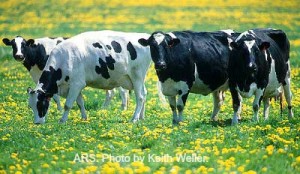Last week, the USDA’s Animal and Plant Health Inspection Service (APHIS) announced its intention to publish a rule that would allow some beef to be imported from countries that have experienced cases of mad cow disease. Bovine spongiform encephalopathy (BSE) is a progressive neurological disorder that is caused by eating a prion protein from infected beef. The prion is not destroyed by cooking. The agency says this is a “modernization” of import regulations.
 Food & Water Watch released a statement about this decision. Wenonah Hauter, Executive Director of that agency, said, “This seems to be another case of trade trumping food safety. This development comes as the reopening of beef trade with Europe has been an issue under discussion in the Transatlantic Trade and Investment Partnership (TTIP) negotiations. Europe would like to increase its beef exports to the U.S., but because of our current policy of restricting the importation of beef products from countries that have experienced mad cow disease, those exports have been minimal. This decision also comes at a time when the Obama Administration cut the frequency of on-site audits performed by inspection personnel of FSIS of countries that have been deemed to have equivalent food safety systems for their meat and poultry exports to the U.S.”
Food & Water Watch released a statement about this decision. Wenonah Hauter, Executive Director of that agency, said, “This seems to be another case of trade trumping food safety. This development comes as the reopening of beef trade with Europe has been an issue under discussion in the Transatlantic Trade and Investment Partnership (TTIP) negotiations. Europe would like to increase its beef exports to the U.S., but because of our current policy of restricting the importation of beef products from countries that have experienced mad cow disease, those exports have been minimal. This decision also comes at a time when the Obama Administration cut the frequency of on-site audits performed by inspection personnel of FSIS of countries that have been deemed to have equivalent food safety systems for their meat and poultry exports to the U.S.”
This rule brings the U.S. policy in line with international standards. But it lifts current restrictions on beef imports from countries that have a “negligible risk for BSE”. This rule change means that, for instance, boneless beef, which has a scientifically negligible risk of BSE transmission, can be imported from countries that have had BSE cases.
The National Cattlemen’s Beef Association praised the new rule, while R-CALF, the rancher trade group, opposes it, saying that the rule relaxes import restrictions too much. Consumers Union also opposes the rule, citing a study that found that 1 in 2,000 people in the U.K. are silent carriers of variant Creutzfeldt-Jakob disease, the human form of BSE. That country has had more than 180,000 cases of BSE in cattle; in comparison, the U.S. has had four cases.
Country of origin labeling laws also come into play with this decision. Without this labeling, consumers have no way of knowing where the beef they are buying was grown and processed.




